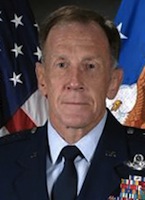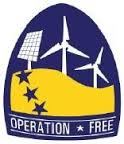 Arizona State University’s Global Institute of Sustainability recently hosted guest speaker and Operation Free representative Lt. Gen Norman Seip (USAF, ret) on the topic of sustainability and national security. The event was part of the Sustainable Speaker lecture series at ASU’s Tempe Campus.
Arizona State University’s Global Institute of Sustainability recently hosted guest speaker and Operation Free representative Lt. Gen Norman Seip (USAF, ret) on the topic of sustainability and national security. The event was part of the Sustainable Speaker lecture series at ASU’s Tempe Campus.
Lt. Gen. Seip retired after 35 years of military service with his last assignment as commander of Davis-Monthan Air Force Base in Tucson, Arizona. The three-star general continues his military support through his work with such non-profit military support organizations as Operation Free and the Truman National Security Project.
“Our nation’s dependence on unstable and unsustainable forms of fuel is a strategic vulnerability,” remarked Lt. Gen. Seip. “The military is moving out rapidly to combat this vulnerability. The Navy and Air Force are using advanced fuels to power its fleets and aircraft. At the 2012 RIMPAC exercise, which is the world’s largest international maritime warfare exercise, the Navy powered an entire Carrier Strike Group fueled by alternative sources of energy. Pilots flew the world’s most advanced combat aircraft up to twice the speed of sound, powered by an American-made biofuel blend made from algae and recycled cooking oil.”
Also in attendance at the lecture was 33-year veteran of the Army and Army National Guard, Lt. Col. Joseph Knott, who was one of 12 veterans recognized during a Nov. 5 ceremony at the White House for their work advancing clean energy and climate security. Lt. Col. Knott is a PhD student at ASU’s School of Sustainability, and a supporter of Operation Free.
 “I spent my career making our military more sustainable and more combat effective and Arizona’s military installations are leading the way,” shared Knott. “Davis Monthan and Luke Air Force bases installed a combined 30 MW of solar. The Army is moving forward to acquire up to 20 MW of solar power for Fort Huachuca, located in Cochise County. And the Arizona National Guard is also leading the way, already having installed over 800 KW of photovoltaic renewable energy generation operating at Guard facilities across Arizona. They have plans to increase their use of renewable energy to support the military readiness of the Arizona National Guard.”
“I spent my career making our military more sustainable and more combat effective and Arizona’s military installations are leading the way,” shared Knott. “Davis Monthan and Luke Air Force bases installed a combined 30 MW of solar. The Army is moving forward to acquire up to 20 MW of solar power for Fort Huachuca, located in Cochise County. And the Arizona National Guard is also leading the way, already having installed over 800 KW of photovoltaic renewable energy generation operating at Guard facilities across Arizona. They have plans to increase their use of renewable energy to support the military readiness of the Arizona National Guard.”
Following today’s event, Operation Free representative and Afghanistan veteran, 1st Lt. Aaron Marquez shared his enthusiasm for the advancements in military sustainability. “I have seen it on the ground in Afghanistan and right here at home. A more sustainable military is a more effective fighting force. Our national security depends on our ability to adapt to the world’s evolving energy environment and innovate new solutions to our energy footprint. It is exciting to see this work taking place at the Pentagon, at Luke Air Force Base and right here at ASU where the School of Sustainability is actively engaging on military sustainability.”

